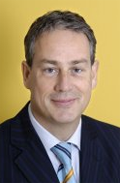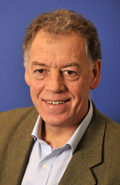New World of Work creates better work-life balance
 A more flexible workplace on the basis of the ‘New World of Work’ makes for greater job satisfaction among knowledge workers; a better balance between work and personal life; higher productivity; as well as increased attention for the environment by reducing commuting traffic.
A more flexible workplace on the basis of the ‘New World of Work’ makes for greater job satisfaction among knowledge workers; a better balance between work and personal life; higher productivity; as well as increased attention for the environment by reducing commuting traffic.
These are the findings of a multi-year study carried out at Microsoft Netherlands, under the leadership of <link people eric-van-heck _self>Eric van Heck, Professor of Information Management & Markets, and <link people peter-van-baalen _self>Dr. Peter van Baalen. The results were presented on November 9 at a symposium in the scope of the campaign week ‘Het Nieuwe Werken Doe je Zelf’ (New ways of work are up to you).
Erasmus@Work research project
Called Erasmus@Work, the study is the first to measure opinions on the New World of Work among knowledge worker over various years. The results of this research into the New World of Work – adopted by Microsoft about five years ago – confirm that this new concept fits in well with the needs of our time. The study consisted of three perception measurements, taken in 2007, 2008 and 2010.
Eric van Heck explains, ‘The experiences at Microsoft show that knowledge workers are quite pleased with the New World of Work. The self-organisation of work – which uses the new opportunities offered by ICT – increases productivity and creates a better balance between people’s work and their personal lives. The findings demonstrate that, after the introduction of the New World of Work, the employees break with the old balance in the organisation and establish a new one, in both their profession and private lives, to accommodate their new way of working. Relationships with colleagues and the line manager undergo changes, while the transparency within the organisation increases. But it is something of a challenge to create a situation in which workers can work together from a distance and still maintain a sense of cohesion on the job and at home.’
 Microsoft asked the researchers to examine the long-term impact of its move into a new building plus the adoption of the New World of Work on employee satisfaction, productivity, the work-life balance, flexibility and innovation. To that end, the Erasmus@Work team examined the situation in 2007 before the company relocation and just thereafter in 2008. The third phase of the study took place in 2010. Each time, the workforce of about 300 was interviewed. The third phase included employee commuting and its effect on the environment for the first time. It turns out that, on average, employees work from home 28 percent of their work time – in order to improve productivity, save time lost on commuting and reduce the amount of commuting and its carbon footprint.
Microsoft asked the researchers to examine the long-term impact of its move into a new building plus the adoption of the New World of Work on employee satisfaction, productivity, the work-life balance, flexibility and innovation. To that end, the Erasmus@Work team examined the situation in 2007 before the company relocation and just thereafter in 2008. The third phase of the study took place in 2010. Each time, the workforce of about 300 was interviewed. The third phase included employee commuting and its effect on the environment for the first time. It turns out that, on average, employees work from home 28 percent of their work time – in order to improve productivity, save time lost on commuting and reduce the amount of commuting and its carbon footprint.
Practical relevance
‘The results achieved at Microsoft are important to the Netherlands because they show how a company with lots of knowledge workers can increase productivity, improve employee satisfaction and also cut down the amount of commuting required,’ says Eric van Heck. ‘This means that we are able to combine greater productivity and satisfaction in the Netherlands with reduced CO2 emissions.’
The Erasmus@Work team has developed a measuring tool that ‘provides organisations a mirror and helps them to come up with tailor-made measures to solve any issues associated with the New World of Work. This is important, because there is a great variety of companies out there whose employees want to determine for themselves how they’re going to organise their work. Improvements will therefore need to be custom-made ones.”
Theo Rinsema, Managing Director of Microsoft Nederland, says the study has provided the company ‘with clear insights that will allow us to progress from here. We have been using the New World of Work for five years now and are running into particular dilemmas connected to aspects of our approach. For example, the need to have face-to-face meetings clashes with our objective of reducing our carbon footprint by 30 percent. Without close cooperation with the scientific world and RSM in particular, we would never have been able to gain the understanding required to bring about further improvements.’


